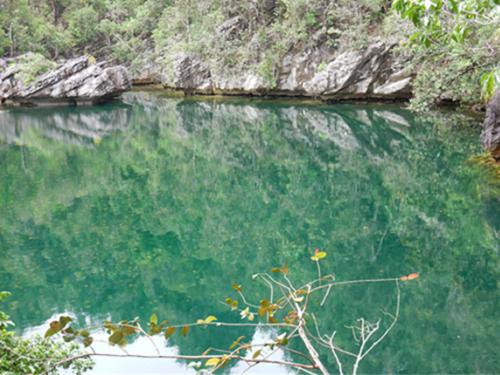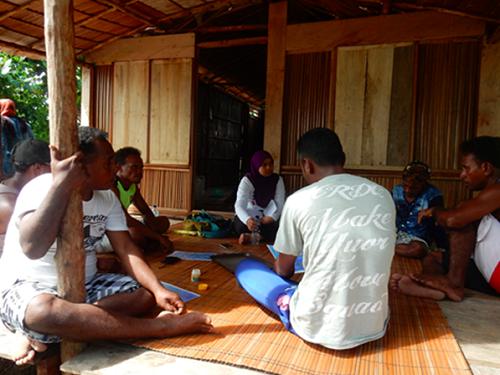Amanda Pricella Putri
This project aims to develop conservation and management strategies together with local stakeholders, set up online registration of visitors, set up information signs so that all visitors know what they can / cannot do, and long-term monitoring of health of jellyfish populations with University of West-Papua.

View of one of the jellyfish lake in Misool.
The jellyfish lake is a “a landlocked islands of sea and filled with a massive population of the golden-jellyfish Mastigias papua and the moonjelly Aurelia aurita” (Becking, 2016). Only 13 gold-jellyfish lakes are known worldwide, and those lakes are located in Palau, Vietnam and Indonesia. Four of these lakes were recently discovered in Misool, Raja Ampat.

Group discussion with the tour guides in Harapan Jaya village.
The gold-jellyfish lakes in Misool have become a new target destination for snorkelers and scuba divers (Becking, 2016). This is unsurprising due to its unique and typical characteristic that is very attractive for tourists. Reflecting cases of the utilization activities within the jellyfish lakes in Palau and Vietnam, touristic activity and others human interventions (for instance; using the lakes as fishponds for aquaculture) have seen as a reason of rapid degradation for both the jellyfish populations and the ecosystem (Becking, 2016). To prevent significant degradation of the jellyfish population and the environment, effective conservation and management strategies of the jellyfish lakes in Misool are urgently needed. However, specific strategies and legal regulations for touristic activity and human interventions have not been developed yet by the local authorities.
There is a will at the local government, the university the NGOs to get involved with this, but they need help in forming a program. I aim to start the process by develop conservation and management strategies of the jellyfish lakes in Misool, Raja Ampat together with related-stakeholders, set up online registration of visitors, set up information signs that so that all visitors know what they can/cannot do, set-up the monitoring protocol together with Universitas Papua, local stakeholders, local authorities, which will make it possible to protect these lakes for a prolonged period. In every activity within this project will enable the local communities, that often neglected in decision making process, using their perspective and experience in conservation and management practices. By involving the local community and various level of stakeholder, not only could be beneficial with exchanging knowledge, but also could help to trigger awareness of the importance of the jellyfish lakes among stakeholders.